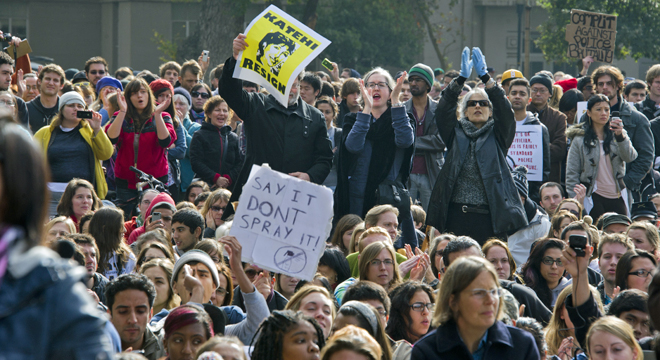When a police officer in riot gear pepper sprayed peaceful, seated protesters at University of California Davis last year, it quickly became one of the enduring images of the Occupy movement.
But the shorthand — “Occupy” — in the national coverage and conversation that followed the incident often obscured the issue at the heart of the students’ protest: tuition costs rising so quickly and so steeply that many fear higher education will soon be out of their reach.
Now, as a lawsuit against the university has been filed, and with the school due to present the findings of its own internal investigation into the incident later in March, the students at the receiving end of the fog want to bring the focus back to what they’re still fighting for.
“I was financially struggling, emotionally, physically, everything,” UC Davis sophomore Sarena Grossjan-Navarro, pepper-sprayed that day told TPM. “I had no address, pretty much a homeless student.”
She had been living in a shack in a friend’s backyard when she got involved with the Occupy movement. She comes from a low-income family and is trying desperately to get through college without going into debt.
It’s an uphill battle to say the least. Grossjan-Navarro doesn’t see a career waiting for her immediately after graduation. She’s studying art and Native American studies. The university told her not to worry about affording college, she said. She gets aid for books and tuition, but not housing. It’s her first time not working since high school. The university keeps getting more privatized, with more Starbucks and money-making ventures, she said. Meanwhile, programs in the humanities get cut.
As local governments tighten their belts, public education is often the target of savings, with university systems passing the burden of rising costs on to students. In 2011 the University of California system collected more money from students than from the state.
Like Grossjan-Navarro, Fatima Sbeih — a senior international relations major — will graduate without debt. But it hasn’t been easy. Sbeih gets scholarship and federal aid, but as fees and tuition increase in the UC system, the assistance doesn’t go as far.
Sbeih has seen friends leave the university because they can’t afford it. She says she will continue to fight for those people who want so badly to be in school, but can’t manage to make ends meet. She doesn’t want to meet another ambitious student, passionate about school, who can’t afford to stay, she says. “They’re no longer here to fight, so I’m gonna fight for them,” she said. “I’m gonna bring awareness to this cause. Not just for those who left, but for those to come.”
Both Sbeih and Grossjan-Navarro are plaintiffs in a lawsuit against UC Davis leaders stemming from the pepper spray incident. Mark Merin, one of the lawyers representing the students, said he wants the university to recognize the campus quad as a public place where “free expression and assembly can occur in a protected environment.” The campus police in November greeted the students “as a threat to their peace and tranquility.”
Sbeih and Grossjan-Navarro said they are more interested in policy changes at the university than any money that could come from the suit. Sbeih said some of the students have talked about investing any money from a settlement back into the university.
On March 1, Occupy protesters are planning a “National Day of Action For Education.” The demonstrations will culminate in a 99-mile march from UC Berkeley to Sacramento.










